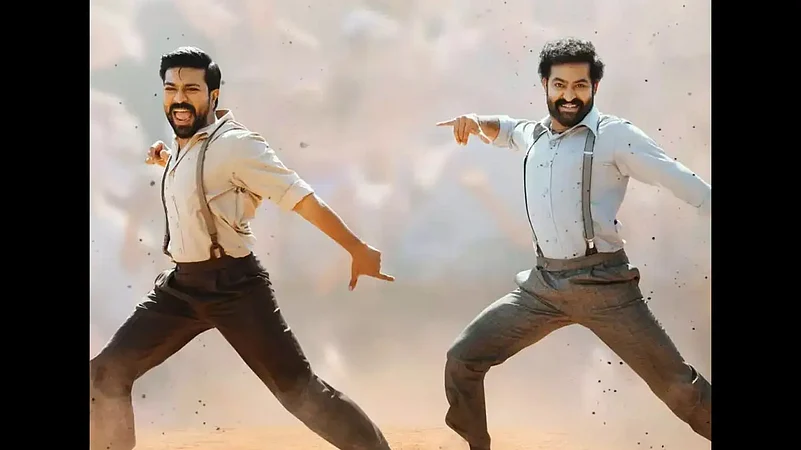The whole of India should dance to the tune of Naatu Naatu from S. S. Rajamouli’s 'RRR' (2022). After all, it has won the coveted Golden Globe Awards for Best Original Song. No mean feat, this!
In fact, the whole of Asia should go “Naatu Naatu ... (or its Hindi version, Naacho Naacho , if you please!) since it happens to be the first song from the continent to have earned such a rare honour.
History bears ample testimony to the fact that any vindication by the West has traditionally been acknowledged with awe and astonishment by the Indian entertainment industry, especially Bollywood, to be the ultimate recognition.
Hence, any honour conferred on Indian cinema at such a prestigious awards ceremony, widely considered to be next only to the Oscars, needs to be celebrated with gusto.
Alas, a spoilsport brigade is sulking, wondering what is so special about M.M. Keerawani’s composition and Chandrabose‘s lyrics to be singled out for such a rare honour? It is not even melodious like A.R. Rahman’s Jai Ho that had won an Academy Award a few years ago, they argue. Others scamper back into the past to dig out an assorted gems of Hindi cinema that have tested the test of the time back home but failed to capture the imagination of the Wise West.
Their argument: When Rafi’s Madhuban mein Radhika (Kohinor/1960) and Dil dhal jaaye (Guide/1965), Lata’s Lag jaa gale (Woh Kaun Thi/1964), Kishore’s Chingari koi bhadke (Amar Prem/1972) and Mere naina sawan bhado (Mehbooba/1976) could not make any learned jury on the other side of Atlantic sit up and take notice, how did 'RRR’s foot-tapper leave an otherwise squeamish lot swaying?
What they are all forgetting rather conveniently is probably the fact that the yawning gap that existed between Indian cinema and its western counterparts for decades has ceased to exist in the digital era now, especially after the advent of a democratic global platform like OTT.
And its impact is of late quite discernible. No longer does one notice an uncannily condescending tone or contemptuous treatment meted out by the West to Indian cinema, especially its mainstream projects.
Barring an occasional applause over the works of Satyajit Ray or a few other greats, the Western cinema universe honchos invariably looked down upon Indian cinema as an avoidable song-and-dance routine. An ineluctable part of Bollywood cinema, such songs often elicited guffaws and disdain in equal measure from the stiff-upper-lip critics.
Naatu Naatu … appears to have turned all of that upside down. Even though it comes from the Telugu film industry, the song reflects as much Bollywood as any other number from the commercial Hindi cinema. Shot on an epic scale perfectly, it is perfectly in sync with the vision and penchant of the great Rajamouli of 'Baahubali' (2015) fame for showing epic-scale grandeur on the screen.
Most Mumbaiyaa filmmakers would have been happy to create a set of a castle in the Film City of Goregaon or head for the good, old Ramoji Studio in Hyderabad but Rajamouli flew his entire unit to shoot Naatu Naatu … in front of the majestic presidential palace of Ukraine barely a few months before the war began. The end result left the West clamouring for more.
Nonetheless, Indian cinema is now treated with more respect than ever not because it is churning out quality stuff like its South Korean, Turkish or Iranian counterparts. While it should not take away the credit from Rajamouli’s team for bringing laurels to the country, it is also true that the emergence of India as a major cinema business hub in the past two decades has played a key role in changing the image of Indian cinema abroad.
Looking back, the post-liberalisation years created a huge market for Indian cinema not only in the West but also in countries like Japan. The burgeoning middle class diaspora, particularly the techies, that rose to prominence in distant countries gave a fillip to the demand for Indian cinema. It made someone like Shah Rukh Khan the 'demigod of box office' across the overseas territories that began to bring more revenue than the total budget of a movie.
Much to its delight, the West also discovered a massive market waiting for it in India to explore the potential of the best or worst of world cinema. Subsequently, Hollywood movies began to be released in India on a big scale alongside their worldwide premieres and raked in huge cash flow. Nowadays, while releasing a film, an Indian filmmaker thinks twice before setting up a clash of his upcoming flick with any Hollywood film.
Hence, the ascendancy of the Indian market for world cinema, both through theatrical and non-theatrical releases, has ensured that a filmmaker from the West can ignore India or its cinema only at his own peril. It is equally true vice-versa.
That is apparently why films like 'RRR' and songs like Naatu Naatu, which would have been summarily dismissed as too ‘over-the-top’for western sensibilities in the past, are grabbing the eyeballs not only in the theatres abroad but also at the prestigious film festivals such as Golden Globes.
From Chetan Anand’s 'Neecha Nagar' (1946) and 'Mother India' (1957) to 'Salaam Bombay' (1988) and 'Bandit Queen' (1994), certain films made by Indian filmmakers had occasionally got appreciation far beyond the Indian shores but the kind of success 'RRR' and its songs have found outside the subcontinent now had always eluded India’s mainstream cinema.
That should be a reason enough for all of us to set our feet tapping to the heady beats of Naatu Naatu … just the way it has been done on screen.

























